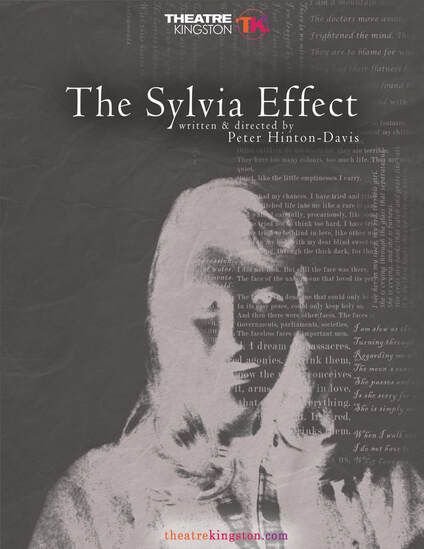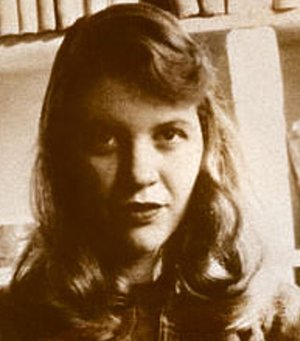From Soul to Stage

The most cohesive piece of theatre I have seen in Kingston.
Content Warning: The Sylvia Effect carefully explores several mental health struggles such as depression, anxiety, trauma, and suicide. It holds little back and asks for us, as a community, to begin examining how we respond to these problems. In light of this, the following review will explore some of the listed elements above.
Written and directed by Peter Hinton-Davis, The Sylvia Effect explores the life of the titular Sylvia Plath (one of the most prolific poets of the 20th century) through the narrative medium of a radio interview. This Theatre Kingston production was the first performance I have seen in Kingston where all of the performers existed within the same creative world. There is a love and passion that each of these artists maintains while Plath’s life, and work, are brought to the stage. Katherine Gauthier as The Poet leads the cast through an inscrutable portrayal of Sylvia Plath. Gauthier is well supported by the protectiveness of The Daughter (Rosemary Doyle), fury of The Son (Ben Sanders), and misguided compassion of The Mother (Margaret Lamarre). They all come together to share an honest and heavy-hearted depiction of the deeply tragic Plath family.

Though the content and subject of the piece is emotionally challenging, the actors masterfully approach the text and character relationships with a thoughtful intentionality typical of Hinton-Davis’ direction. I find it humorous that this play addresses the exploitation of artists life posthumously while also exploiting the life of Sylvia Plath for theatrical content, but we live in a world of contradictions and hypocrisy, which is felt in Plath’s own body of work and, evidently, is present here as well.
For those that do not know, Sylvia Plath committed suicide at the age of 30. Many years later at the age of 47, and 10 years after his father’s death, her son would also choose to end his life. Her mother Aurelia died late in life due to complications with Alzheimer’s. Sylvia is survived only by her daughter, Freida, who has staunchly guarded her mother’s works. In regards to her family’s tragic lives, Freida says “One of the things I’ve learned is, if we try and put sadness off, it just waits. And in my experience, running away from sadness doesn’t do anybody any good.” I sincerely hope anybody out there struggling with their mental health will heed the hard earned wisdom of Freida’s words and seek out resources to prevent further tragedies. Here is a list of resources for anyone currently struggling.
The set itself is designed by Anahita Dehbonehie, and staged as a radio interview show where Sylvia, accompanied by her son, daughter, and mother, are periodically asked questions about their life stories. At times it feels like they are being held captive and being interrogated antagonistically, which is reflective of how Sylvia’s work has been treated after her death creating a poetic congruency between reality and the performance.
It is here that the core of the piece permeates. We, as a society, have a horrid habit of glorifying and epitomizing artists only once they have passed. We tear apart their legacy, feast on their compositions, and dissect their personal lives to understand the climate in which these treasures were forged. In this play, we are the monsters, we are the antagonists, and we hold the Plath family in purgatory demanding to “tell us their story”. We, we, we… We need to be better than this, and yet, we never are.

Hemingway, Van Gogh, Cobain, Ledger, Williams, and Plath. Whether they were adored and loved during their time, or after, their families and lives were horribly exploited by the public and this has caused an intergenerational trauma to occur for many of them. This play looks at how the legacy of Sylvia was passed to her children by the media, not by their family. That it was the public which dictated who Sylvia was, and in turn who her children would become. The only antagonist in this story is us, the audience.
As a creative framework, it began to feel superfluous at times, serving to fit the set within an aesthetic rather than finding its home in motifs. It also served as the conduit to include another family member of Sylvia’s, but this choice lacked intentionality. If Warren Plath (Sylvia’s brother) was involved with radio broadcasting or in some form or fashion related to this communicative medium, then the choice would feel more justified, but he doesn’t. This is only made more confusing by how thoughtfully every other character is explored.

Katherine Gauthier—what a haunting vision of Sylvia she is! The thoughtful and diligent study of her subject was chilling. She rose from her chair as if summoning and breathing Plath into her very essence, begging us, as the audience, to observe as the séance conjured, into our ears, the ethereal words Plath once ushered to her page.
Sanders generously offers his take on Sylvia’s son, Nicholas, to the other actors on stage. He constantly finds opportunities to play and sticks the landing each time. This is a rare occurrence in my experience as playing emotions like resentment, grief, and anger can oftentimes be isolating for one’s scene partner, but not for Sanders. He relishes in the trenches of emotional turmoil, and the most beautiful thing about his portrayal is that he pushes others away to keep them out of those same trenches.
Doyle is well known in the Kingston theatre community, but I personally had no idea what to expect when I heard she was acting in this performance, and my goodness, what a splendid performer she is! While she delivers some of the best lines in the play, poking and prodding us as audience members to question how we honour the dead and survive our ancestors, some of her best moments are found in the silence. Doyle takes the time to allow each actor’s words to pass through her very soul. The beauty of this is, while Gauthier conjures, Doyle is possessed, creating an intangible throughline of the mother-daughter relationship the two shared on stage.
My only words of warning for the interested and intrigued is that this show is certainly for theatre enthusiasts and poetry fanatics. My partner and I arrived at 7:15pm and left the theatre just after 10:00pm with a 15 minute intermission in the middle. If you can handle that beastly length of a performance you are in for an amazing time!
The Sylvia Effect runs from October 27th-November 14th at the Kingston Grand Theatre. Click here for tickets and more information.
